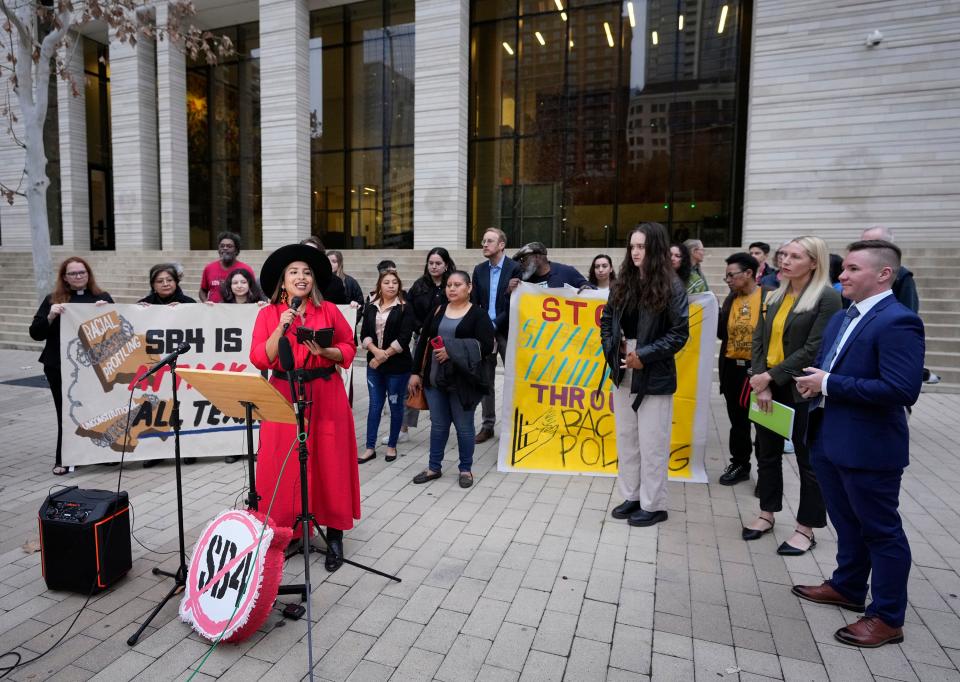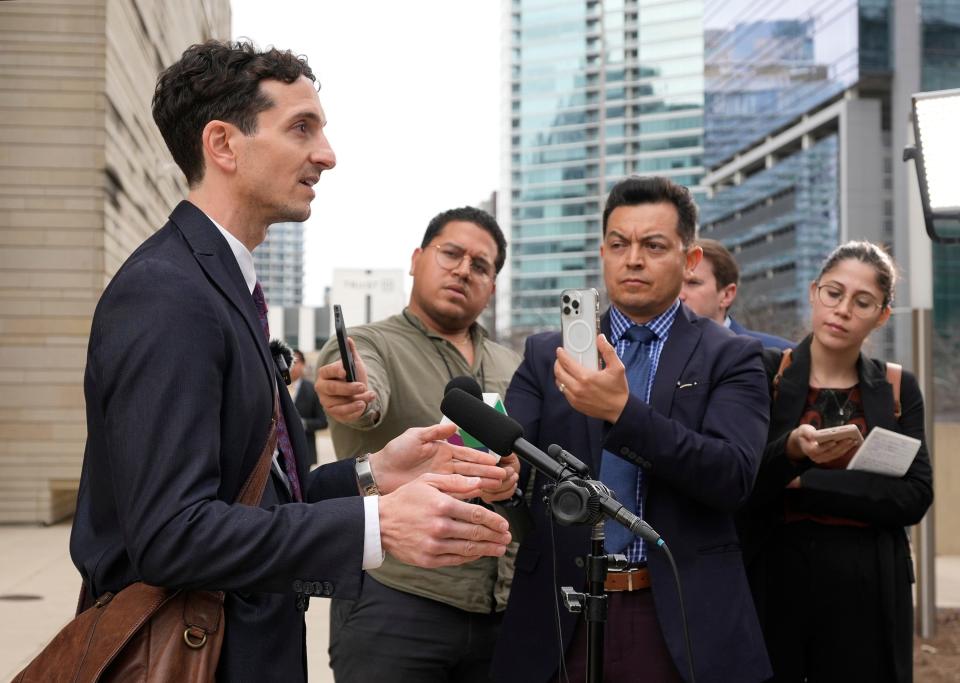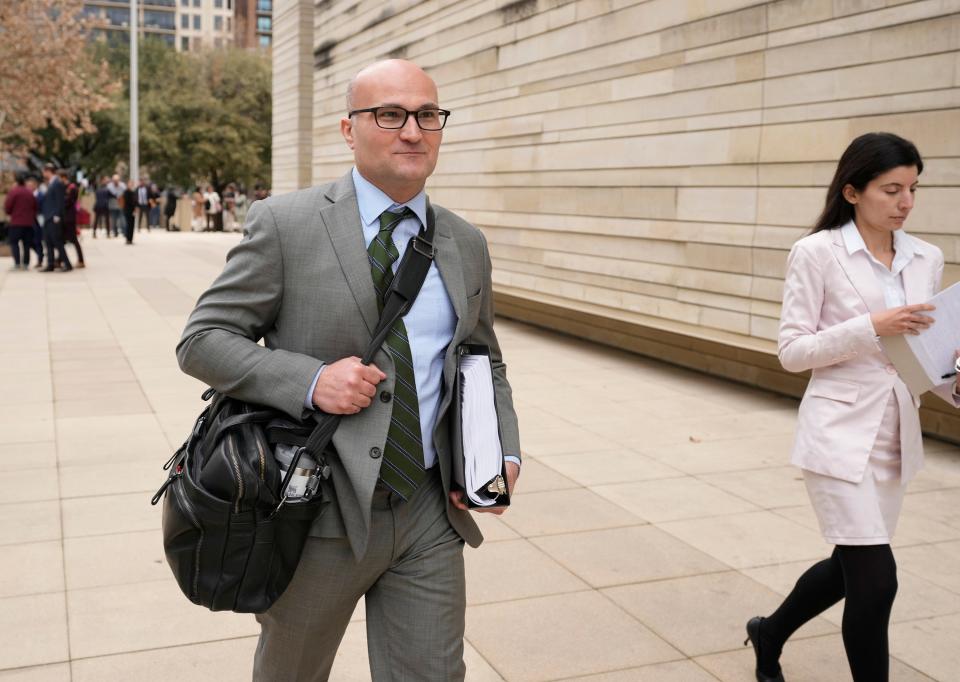Federal judge blocks Texas from enforcing sweeping state immigration laws passed last year
A federal judge in Austin ruled Thursday that Texas cannot enforce a new set of immigration policies the Legislature passed last year, and he halted, at least temporarily, Senate Bill 4 from going into effect next week.
After a hearing Feb. 15 in which federal prosecutors argued that immigration enforcement is beyond the purview of state governments, Judge David Ezra of the U.S. District Court for the Western District of Texas agreed with those constitutional concerns.
"Several factors warrant an injunction," Ezra wrote in his ruling to enjoin SB 4. "First, the Supremacy Clause, and Supreme Court precedent affirm that states may not exercise immigration enforcement power except as authorized by the federal government."
Texas' lawyers filed an immediate appeal to the 5th U.S. Circuit Court of Appeals shortly after Thursday's ruling.

Passed by the Legislature during a special session in November, SB 4 creates a series of state penalties for anyone suspected of coming into Texas from Mexico other than through a legal international port of entry. The penalties range from a Class B misdemeanor to a second-degree felony.
SB 4, which was set to go into effect Tuesday, would also require people accused of illegally crossing the state's southern border to either accept a magistrate judge's deportation order or face a second-degree felony for noncompliance.
Federal prosecutors filed their lawsuit against the state in January and joined previous suits filed late last year challenging SB 4 by the ACLU, ACLU of Texas, Las Americas Immigrant Advocacy Center, American Gateways, the Texas Civil Rights Project and the County of El Paso.

“El Paso County applauds the court’s clear confirmation today that immigration policies rest solely under Federal jurisdiction, and the state of Texas’ interference with the U.S. Constitution will not be tolerated," said El Paso County Commissioner Iliana Holguin in a statement after the ruling. "A piecemeal approach from individual states on federal matters such as immigration enforcement would put an undue burden on local taxpayers, while opening the door to potential civil rights violations for border residents and immigrants alike.”
Ezra similarly indicated further concerns over conflicting provisions between SB 4 and federal immigration law, which would be "to the detriment of the United States’ foreign relations and treaty obligations."
More: Federal judge skeptical of Texas' sweeping immigration law, says ruling will come 'soon'
Striking against the heart of Texas' argument laid out Feb. 15 by Ryan Walters, the state attorney general's office special litigation chief, Ezra found that an influx of migrants and immigration surges do not invoke the meaning of an invasion, and Texas would not be engaging in its limited war powers by enforcing SB 4.
Additional issues with the law could frustrate the asylum processes and allow for the incarceration of noncitizens before their possible removal, making it substantially harder for those noncitizens to apply for asylum after entering the country, Ezra wrote.

“We have appealed this incorrect decision,” Texas Attorney General Ken Paxton said in a statement Thursday. “I will do everything possible to defend Texas’s right to defend herself against the catastrophic illegal invasion encouraged by the federal government.”
Gov. Greg Abbott also vowed to continue fighting to enact SB 4, saying in a statement that an immediate appeal is necessary in response to the Biden administration's border policies as Texas Republicans keep highlighting the surge in migration ahead of Tuesday's primary election.
"Texas will immediately appeal this decision, and we will not back down in our fight to protect our state — and our nation — from President Biden's border crisis," Abbott said. "Texas has the right to defend itself because of President Biden's ongoing failure to fulfill his duty to protect our state from the invasion at our southern border.
"Even from the bench, this district judge acknowledged that this case will ultimately be decided by the U.S. Supreme Court."
Having previously acknowledged the politics behind SB 4 and the likelihood the case would reach a higher court, Ezra's ruling was handed down on the same day that President Joe Biden and former President Donald Trump were separately visiting the Texas-Mexico border.
More: Joe Biden, Donald Trump border visits spotlight newly competitive politics of South Texas
"Finally, to allow Texas to permanently supersede federal directives on the basis of an invasion would amount to nullification of federal law and authority — a notion that is antithetical to the Constitution and has been unequivocally rejected by federal courts since the Civil War," Ezra wrote.
During the court's Feb. 15 hearing on SB 4, Ezra told the court that he expected to make an expedited ruling on the case as to maintain a status quo ahead of the law taking effect March 5, allowing ongoing court considerations and subsequent appeals to occur without activating its provisions.
This article originally appeared on Austin American-Statesman: Days ahead of its enactment, federal judge bars Texas immigration law
Solve the daily Crossword

